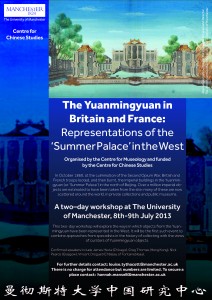New Perspectives on the Chinese 1950s Workshop
King’s Manor, University of York
19-21 July 2012
This workshop has been funded by the British Inter-University China Centre (AHRC) through the Chinese 1950s Network. The network explores new approaches China’s domestic and international history in this period, it is hosted at the University of York and partnered with East China Normal University (ECNU) in Shanghai.
The aim of the workshop is to promote the sharing of ideas on historical issues and primary source work, the establishment of a network of researchers and to explore the potential for future collaborative work.
PLEASE NOTE: For logistical reasons this is an invitation-only event, panel details are for information only
Friday 19th July
Panel 1 – Writing the 1950s (culture, society, knowledge and history) Chair: Karl Gerth
Felix Wemheuer (University of Vienna), How to Write a People’s History of 1950s: A Thought Experiment
Jennifer E. Altehenger (King’s College London), Finding the Right Words: Encyclopedic dictionaries, self-help guides, and the politics of knowledge in China, 1949-1956.
Panel 2 – Individuals and Institutions, Chair: Julia Lovell
Xiaobing Tang (University of Michigan), The Idea of Socialist Art in the 1950s.
Christine Vidal (Université Lille III), From Beijing to Hangzhou: Song Yunbin and his experience of united front work (1949-1957).
Gordon Barrett (University of Bristol), Transnational Contacts and Foreign Policy: the CCP, Chinese Scientists, and the World Federation of Workers, 1947-1966
Saturday 20th July
Panel 3 – The Economy and Society, Chair: Tehyun Ma
Robert Cliver (Humboldt State University), Surviving Socialism: Private Industry and the Transition to Socialism in China
Felix Boecking (University of Edinburgh), Dismal scientists among the hundred flowers: Chinese economists in the 1950s
Benno Weiner (Appalachian State University, NC), High Tide on the High Plateau: The United Front and Pastoral Collectivization in Northeast Tibet (Amdo), 1955-1956
Keynote by Yang Kuisong (East China Normal University/Peking University) on the state of the field and future directions
Panel 4 – China and Japan in the 1950s, Chair: Chris Hess
Amy King (Australian National University), Dealing with the ‘Enemy’: Overseas Japanese in the Soviet Union and People’s Republic of China, 1945-1956
Barak Kushner (University of Cambridge), The Dissolution of the Japanese Empire and the Struggle for Legitimacy in Postwar East Asia, 1945–1965
Sunday 21st July
Panel 5 – China’s Urban 1950s, Chair: Jon Howlett
Karl Gerth (University California, San Diego), Compromising with Consumerism in
Socialist China: Transnational Flows and Internal Tensions in ‘Socialist Advertising’
Christian Hess (Sophia University), Living the socialist high life? Colonial legacies and the making of urban socialism in Dalian, 1945-1955
Jiang Jin (East China Normal University), Urbanism vs. Communism? Best-Seller theatres in Early PRC Shanghai



